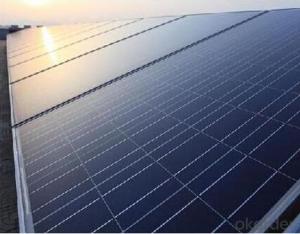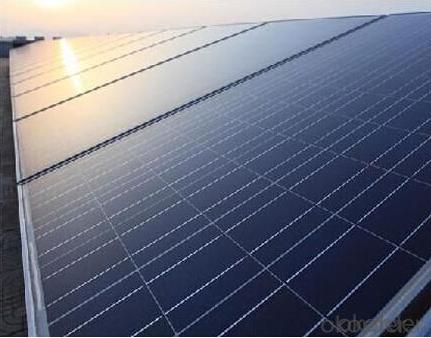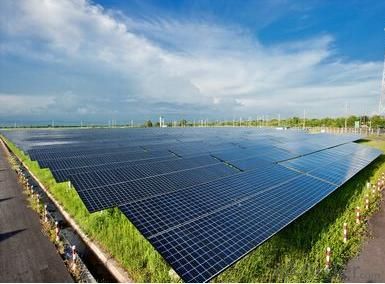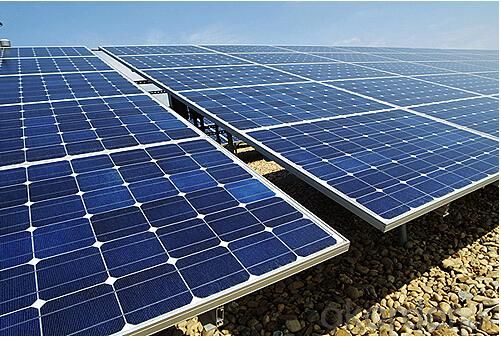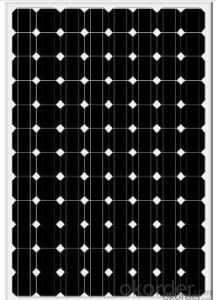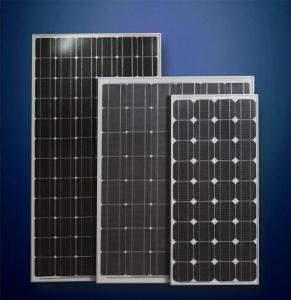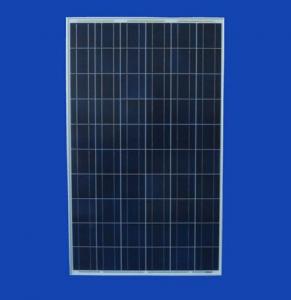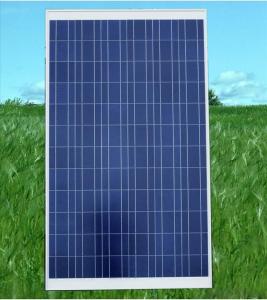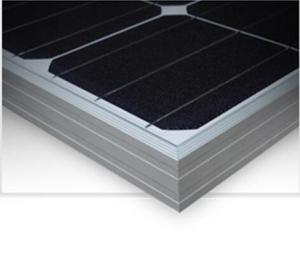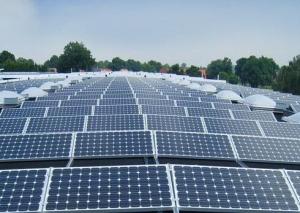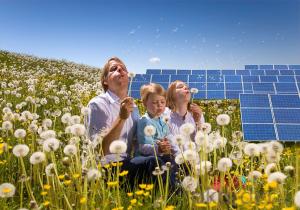36 Volt Polycrystalline Silicon Solar Modules 72cell-305w
- Loading Port:
- China Main Port
- Payment Terms:
- TT or LC
- Min Order Qty:
- 1000 watt
- Supply Capability:
- 10000000 watt/month
OKorder Service Pledge
OKorder Financial Service
You Might Also Like
1. Structure of Polycrystalline Silicon Solar Modules 72Cell-305W Description
Solar panels can be used as a component of a larger photovoltaic system to generate and supply electricity in commercial and residential applications.
-Tests by independent laboratories prove that modules:
Fully conform with certification and regulatory standards.
Withstand wind loads of up to 2.4kPa and snow loads of up to 5.4kPa, confirming mechanical stability.
Successfully endure ammonia and salt-mist exposure at the highest severity level, ensuring their performance in adverse conditions.
- High effi ciency, multicrystalline silicon solar cells with high transmission and textured glass deliver a module effi ciency of up to 16.0%, minimizing installation costs and maximizing the kWh output of your system per unit area.
- Tight positive power tolerance of 0W to +5W ensures you receive modules at or above nameplate power and contributes to minimizing module mismatch losses leading to improved system yield.
- Top ranking in the “TÜV Rheinland Energy Yield Test” and the “PHOTON Test” demonstrates high performance and annual energy production.
2. Main Features of the Polycrystalline Silicon Solar Modules 72Cell-305W
* WARRANTIES
- 10-year limited product warranty1.
- Limited power warranty1: 1 year at 98% of the minimal rated power
output, 10 years at 92% of the minimal rated power output, 25 years
at 82% of the minimal rated power output.
1In compliance with our Warranty Terms and Conditions.
*QUALIFICATIONS & CERTIFICATES
IEC 61215, IEC 61730, MCS, CE, ISO 9001:2008, ISO 14001:2004, BS OHSAS 18001:2007, PV Cycle, SA 8000
3. Polycrystalline Silicon Solar Modules 72Cell-305W Images
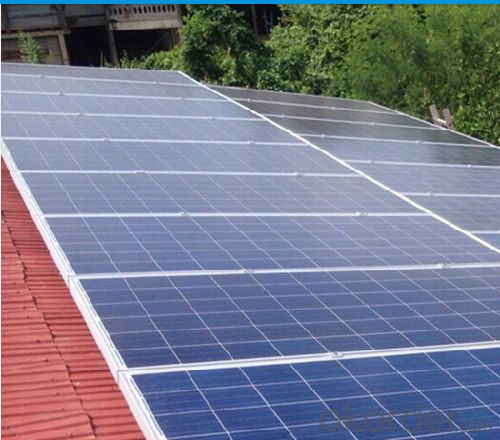
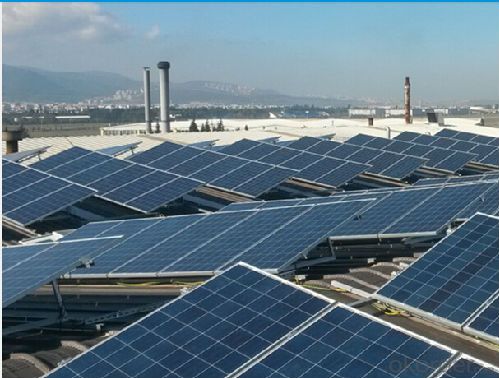
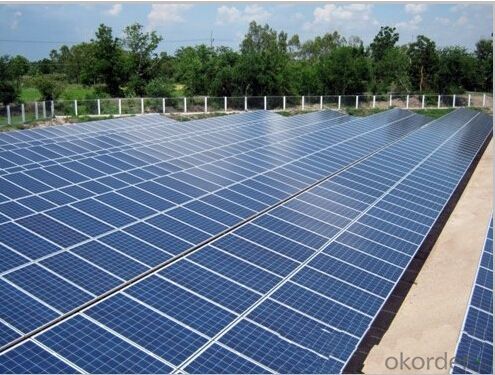
4. Polycrystalline Silicon Solar Modules 72Cell-305W Specification
Electrical parameters at Standard Test Conditions (STC)窗体底端 | |||
Power output | P max | W | 305 |
Power output tolerances | ΔP max | W | 0 / + 5 |
Module effi ciency | η m | % | 15.7 |
Voltage at Pmax | V mpp | V | 36.1 |
Current at Pmax | I mpp | A | 8.45 |
Open-circuit voltage | V oc | V | 45.4 |
Short-circuit current | I sc | A | 8.93 窗体底端 |
5. FAQ of Polycrystalline Silicon Solar Modules 72Cell-305W
(1) Can you offer the test report of the module?
Sure. All the solar modules must pass necessary tests including EL test and ultra-red test and other visual test of the apperance, and the test report presents all the detailed data of the modules.
(2) How to confirm about the quantity and the type of solar module?
It depends on the solar system where you want to put into use the solar modules. We have experienced engineers to design for your order and you need to give more information to fix the details.
(3) How long will you deliver the solar modules?
We need to purchase the materials according to the list confirmed by you and put into production, and we will do our best to get your satisfaction.
- Q: I am doing a project on solar energy at the moment and I was just wondering how.
- my theory is that when sunlight hits the panel it excites the electrons from the rays there by making them move more quckly and attract them to a source with less elctrons making the panel positiveli charge and the electron collector negatively charged thereby connecting the negatively charged particles to which ever body it wishes to donate it too thereby causing electric charges
- Q: Can solar panels be installed on schools or educational campuses?
- Yes, solar panels can be installed on schools or educational campuses. In fact, many educational institutions are increasingly adopting solar energy systems as a sustainable and cost-effective solution for their power needs. Installing solar panels on schools not only helps reduce carbon emissions and reliance on fossil fuels, but also provides educational opportunities for students to learn about renewable energy and its benefits. It can also lower electricity bills and redirect saved funds towards educational programs.
- Q: I mean like bread is made of wheat, what are solar panels made up of?How are they manufactured?
- Solar panels (aka photovoltaic panel) are most often made up of thin wafers of crystalline silicon or cadmium telluride. As photons from the sun enter the photovoltaic cell, electrons are freed from the substrate when are then collected by wires that run throughout the panel. And as we know electrons=electricity!
- Q: I don't have a regulator connected as they are a little expensive for a pensioner, If I join the panels into line to the battery bank from the roof should that be OK.?
- I am pretty darn sure you need the regulator because all the advertising says that you must have one if you have more than one small solar panel. I think you can overcharge your batteries otherwise. Solar power is still not cost effective, so most people have solar power because they care about the environment more than they care about expenses. If you are poor, it is better to skip solar power, unless you are in an area where there isn't access to electricity. For example, we have a cabin without electricity. I am a strong environmentalist, too. Solar power is too expensive still, for low income people. It is better to focus on energy conservation, imo. such as change your roof to white, to save on A/C, as the head of the US energy dept. says (he is a nobel prize winning physicist). PS Dave might be right on that stuff, i don't know. but all the ads say you need a regulator if you are going to have more than one solar panel so I assumed this was due to risk of overcharging.
- Q: How do solar panels affect property value?
- Solar panels can have a positive impact on property value as they are considered a valuable addition to a home. Studies have shown that homes equipped with solar panels tend to sell for higher prices compared to similar homes without them. Additionally, solar panels can help homeowners save on energy costs, making the property more appealing to potential buyers.
- Q: Where can I find the info (sites) that clearly gives the anatomy of a solar panel?Likewise, I want to know where can I find (sites) the solar panel that produces 3.75 v? Thank you very much!!!
- You've probably seen calculators that have solar cells -- calculators that never need batteries, and in some cases don't even have an off button. As long as you have enough light, they seem to work forever. You may have seen larger solar panels -- on emergency road signs or call boxes, on buoys, even in parking lots to power lights. Although these larger panels aren't as common as solar powered calculators, they're out there, and not that hard to spot if you know where to look. There are solar cell arrays on satellites, where they are used to power the electrical systems. You have probably also been hearing about the solar revolution for the last 20 years -- the idea that one day we will all use free electricity from the sun. This is a seductive promise: On a bright, sunny day, the sun shines approximately ,000 watts of energy per square meter of the planet's surface, and if we could collect all of that energy we could easily power our homes and offices for free.
- Q: Are there any safety precautions to consider when installing solar panels?
- Yes, there are several safety precautions to consider when installing solar panels. Firstly, it is important to ensure that the area where the installation will take place is free from any potential hazards, such as loose debris or electrical cables. It is also crucial to follow proper electrical safety procedures, such as turning off the power supply before starting the installation and using appropriate personal protective equipment. Moreover, working at heights can pose risks, so it is essential to use proper equipment like safety harnesses and scaffolding when necessary. Lastly, it is recommended to consult with a professional or an experienced installer to ensure compliance with local building codes and safety regulations.
- Q: Can solar panels be used in developing countries?
- Yes, solar panels can be used in developing countries. In fact, they can be a particularly beneficial source of energy in these regions. Solar panels are cost-effective, environmentally friendly, and can provide reliable electricity to areas with limited access to traditional power grids. Additionally, solar energy can help drive economic growth, improve living conditions, and enhance resilience to climate change in developing countries.
- Q: How do solar panels and heaters work?
- Solar panels are solar powered- they use energy produced from the sun. While heaters- receive already produced energy to produce heat... hope this helps!
- Q: Are solar panels expensive?
- Solar panels can be expensive upfront, but they are a long-term investment that can save money on electricity bills in the future. The cost of solar panels has decreased significantly in recent years, making them more affordable for many homeowners and businesses. Additionally, there are various financing options available that can help make solar panels more accessible to a wider range of people.
Send your message to us
36 Volt Polycrystalline Silicon Solar Modules 72cell-305w
- Loading Port:
- China Main Port
- Payment Terms:
- TT or LC
- Min Order Qty:
- 1000 watt
- Supply Capability:
- 10000000 watt/month
OKorder Service Pledge
OKorder Financial Service
Similar products
Hot products
Hot Searches
